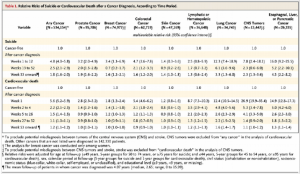Death from Diagnosis: How the dangers of cancer go beyond the disease itself
By Apoorva Gupta | December 04, 2012 2:52 pm

Dov Siporin, Cancer Warrior
Dov Siporin is no stranger to the perils of cancer. When he was diagnosed in 2008 with tumors around his liver, heart, pancreas and lymph nodes, he became traumatized. “I had a lot of other plans,” he said in an interview with KSL news, “and none of them included cancer.”
Simply put, cancer is terrifying. The prospect of death can devastate a patient’s life, and even if a case is curable, the inevitable symptoms and treatments can be excruciatingly painful.
As it turns out, however, the disease itself is not the only problem. Scientists have found that trauma from cancer diagnosis alone can also lead to death, as patients may exhibit cardiovascular problems or, like Dov, consider suicide.
In the study released earlier this year in The New England Journal of Medicine (NEJM), researchers examined data on over 6 million subjects from Sweden and found that more than 500,000 of them had some type of cancer. They then determined which of these patients died as a result of suicide or cardiovascular problems such as heart attacks or stroke. They used statistical analysis to measure the relationship between cancer diagnosis and these events, and their calculations focused on set time periods after the patients were diagnosed.
The study showed that the possibility of death from suicide and cardiovascular malfunctions was significantly higher among cancer patients within weeks of diagnosis. Overall, the risk of suicide increased by 12.6% and the risk of cardiovascular death increased by 5.6% compared to subjects who did not have cancer. The results were especially prominent in cases in which the predicted course of the cancer was bleak or if the cancer type was historically fatal.
Consequently, the scientists were able to show that the time period following diagnosis is difficult and potentially deadly for cancer patients. “Our findings suggest that a cancer diagnosis is a major stressor, one that immediately affects the risk of critical, fatal outcomes,” they declared in their paper.
Dov knows from experience that cancer diagnosis can be overwhelmingly distressing. However, he also knows death from diagnosis can be prevented with the right motivations. Although he did consider committing suicide after he was told he had cancer, his love for his wife and two children prevented him from doing so. “I could spend all my time worrying about that death, and worrying about the pain, and then I would lose everything that I have right now,” he said. Dov’s story demonstrates that building systems of support can help decrease a patient’s anxiety after diagnosis, making it easier for them to live it through.
In addition, the NEJM article stated that another method of preventing such death is by the development of enhanced cancer screening policies. By bettering their detection, cancers could be caught at earlier stages. This would make treating them much easier and improve their prognoses, thus decreasing the trauma that comes with diagnosis.
Scientists have been making some progress in the field of cancer, as shown by the decrease in rates of death from cancer over the past two decades. Nevertheless, a fourth of all deaths in the United States are still caused by the disease, and the American Cancer Association estimated that about 600,000 cancer patients will die in 2012. Cancer is far from being neutralized, and until it is overpowered, diagnosed patients will continue to experience psychological and physiological stress. It is imperative that steps are taken in cancer care to prevent death as a result of cancer diagnosis.
Further Reading: “Cancer Diagnosis Ups Risk of Suicide, Cardiovascular Death”
References:
Fang, Fang, Katja Fall, et al. “The New England Journal of Medicine.” New England Journal of Medicine. 366.14 (2012): 1310-18. Web. 18 Nov. 2012. <http://www.nejm.org/doi/full/10.1056/NEJMoa1110307>.
Stagg, Jennifer. “Healing with humor: Cancer patient has unique way of spreading happiness.” KSL.com . KSL Broadcasting, 22 Nov 2012. Web. 3 Dec 2012. <http://www.ksl.com/?nid=148&sid=23076693>.
Categorized under: Health, Cancer, Human Body For more popular science writing, return from whence you came.